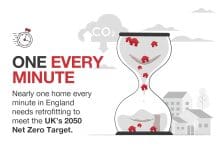Dr Mike Pitts, deputy challenge director for Transforming Construction at Innovate UK, looks back on the first year of the Construction Leadership Council’s Construct Zero programme and the final year of the Transforming Construction challenge
The first year of the Construction Leadership Council’s Construct Zero programme coincided with the final year of the Transforming Construction challenge managed by UKRI. The challenge provided once-in-a-generation innovation funding to help the construction sector transform and be able to deliver what society needs in the future. The programme was a significant collaboration between government and industry, bringing in expertise from energy, digital and manufacturing sectors.
The challenge was aligned with the Construction Sector Deal and had three main aims
Value
The first was to support a shift to a value-based approach to construction projects. The system for construction had evolved to deliver the cheapest asset, rather than the one with the greatest lifetime value to the economy, society, and environment. The challenge funded Construction Innovation Hub, which developed the Value Toolkit, now embedded in government procurement processes to enable this.
Process
To focus on value, construction needed to look at its processes and remove steps that added cost but not value. This meant learning from high-value manufacturing and considering the process as a whole. Impressive results were demonstrated by taking this approach, with capital and whole-life costs slashed, project time halved and productivity boosted by over 10%.
The rise in construction sector productivity since covid shows this progress may be sticking. The challenge supported the delivery of the Forge building by LandSec, which saw a 10% capital cost reduction and 14% improvement in productivity for the world’s first kit-of-parts office building.
Carbon
Lastly, the challenge sought to deliver buildings that were net zero in operation, with embodied carbon cut by half. More efficient processes and clever innovations such as HIPER Pile cut material use and consequently carbon. We supported the development of a net zero design guide for schools in GenZero.
Tackling in-use carbon was a different challenge. It meant shifting buildings from being a load on the energy network to being an active part of it, by integrating renewables at a building level. The aim is buildings that generate, store and manage their own energy.
Alongside energy efficiency considerations, doing all this at the design stage means net zero in operation is very affordably achievable. The challenge funded Active Building Centre developed a blueprint for constructing net zero homes at roughly the same cost as not when avoided energy network connection and upgrade is taken into account.
Priorities of Construct Zero
For those familiar with the Construct Zero programme, for which UKRI is pleased to be a partner of, the challenge supported projects aligned to the majority of the Construct Zero priorities, accelerating solutions and driving progress in partnership across the sector.
The challenge funded a host of solutions to deploy Modern Methods of Construction and improved onsite logistics to reduce waste and transport movement. Examples include LAMP, which tracked material use on site to optimise operations, and Cloud Box, which put sensors on concrete trucks to ensure timely delivery and reduced waste.
The challenge funded improvements to construction processes focused on delivering buildings with greater energy efficiency, such as those at Hope Rise in Bristol. The Active Building Centre explicitly drives commercialisation of renewable technologies at a building level.
The programme also supported numerous projects to account for carbon in designing buildings. These include the artificial intelligence-driven AACE, which is being trialled on HS2, and SEISMIC, which optimised steel frame construction to reduce material and deliver as a kit-of-parts to site.
One gap between Transforming Construction and Construct Zero was on retrofit. The challenge was focused on new build only. However, at Innovate UK we have since developed a net zero strategy and a core pillar is Net Zero Heat – moving away from gas for heating space and water in buildings. The programme was developed to align with Construct Zero and new competitions and support are launching from November 2022 through April 2023.
In parallel, Construct Zero has also developed its approach on retrofit, as illustrated in the recent response to the Skidmore Review. We both welcomed the Chancellor’s recent announcement on a national retrofit programme and we look forward to continuing to work in partnership with Construct Zero.
Net zero: Progress in summary
It became very clear during the challenge, and the shaping of the Construct Zero strategy, that construction can provide the solutions to one of the pressing societal issues of today- reducing our carbon emissions. With the progress of Construct Zero, construction should look at itself with renewed pride and enthusiasm about its future role.
To learn more about the Transforming Construction challenge and its outputs, please visit www.ukri.org/TCC
 Dr Mike Pitts
Dr Mike Pitts
Deputy challenge director for Transforming Construction
Innovate UK
www.ukri.org/councils/innovate-uk/














